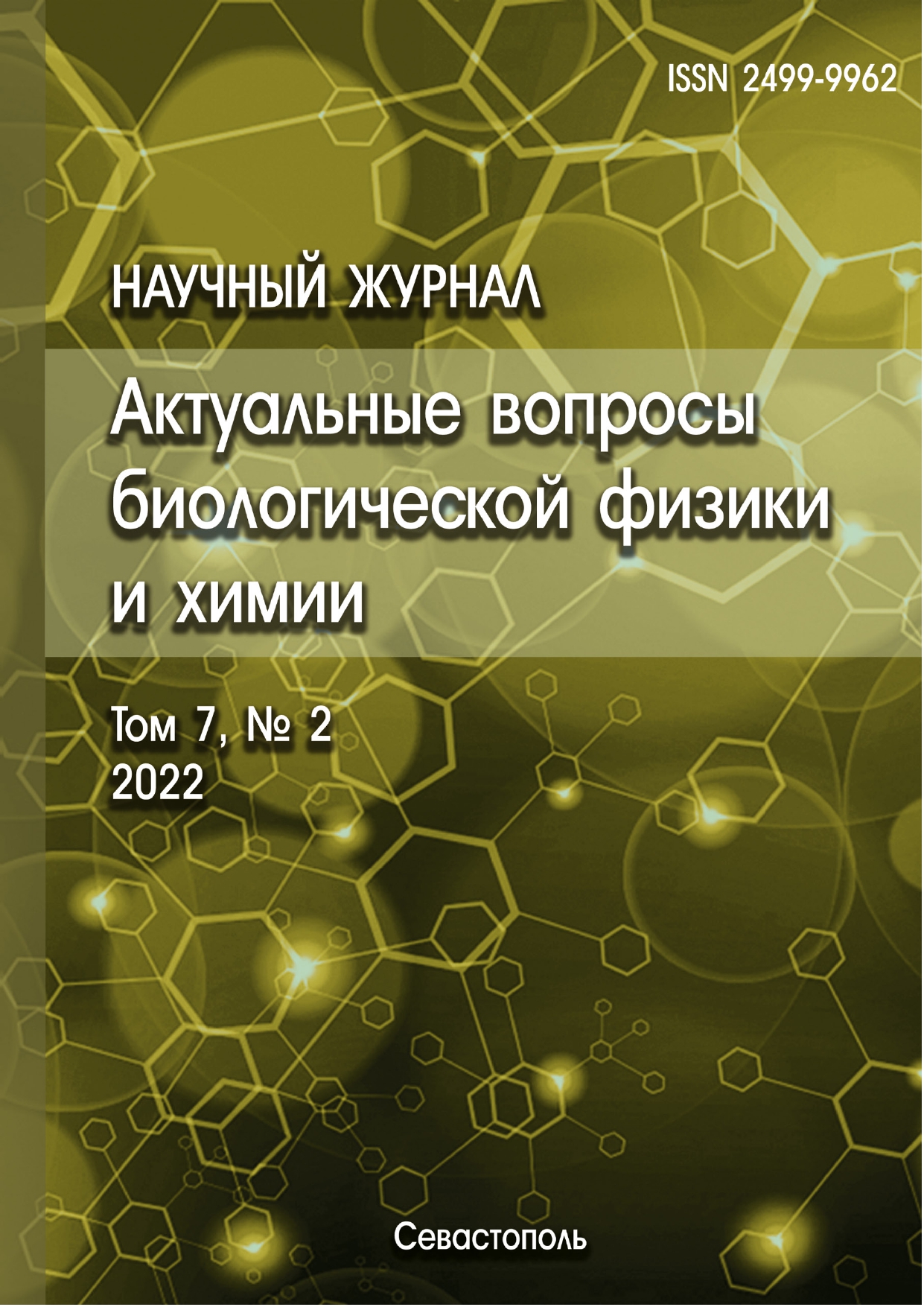Баку, Азербайджан
Баку, Азербайджан
Баку, Азербайджан
Баку, Азербайджан
Национальный центр онкологии Министерства здравоохранения Азербайджанской Республики
Баку, Азербайджан
Баку, Азербайджан
It is widely accepted that the lipid compositions of the plasma membranes of healthy and cancer cells significantly differ from each other. During the cancer progression, cancer cells change the lipid constituent of the membranes resulting in the loss of lipid asymmetry between the membrane leaflets. Consequently, physicochemical properties of the cell membranes are also changed in response to altered lipid organization. Partitioning of the spin probe 2,2,6,6-tetramethylpiperidine-1-oxyl (TEMPO) into the membranes of the cells has broadly been applied to characterize membrane properties of various cells in health and disease conditions. In this work, we used liposomes fabricated using lipids extracted from normal and carcinoma cells. This system permits the determination of the properties of the healthy and cancer cell membranes provided exclusively by its lipid components. Application of TEMPO-benzoate, in which the benzoate group is attached to the TEMPO, indicates significantly enhanced discrimination of liposomes between cancer and normal cells. Partitioning experiments with TEMPO-benzoate revealed relatively enhanced incorporation efficiency for liposomes of cancer cells. On the contrary, TEMPO incorporation efficiency in the same liposomes of cancer cells was not much different compared to healthy cells. Data indicate that TEMPO-benzoate as a probe is more suitable than TEMPO to discriminate cancer cells from healthy cells. Free energy gain observed for TEMPO-benzoate resulted mainly from the hydrophobic effect of the benzoate group.
Electron paramagnetic resonance, TEMPO, TEMPO-benzoate, partitioning, lung carcinoma, cell membrane lipid composition
1. Meacham C.E., Morrison S.J. Tumour heterogeneity and cancer cell plasticity. Nature, 2013, vol. 501, no. 7467, pp. 328-337. DOI: https://doi.org/10.1038/nature12624; EDN: https://elibrary.ru/RKUNFT
2. Singh A.K., Arya R.K., Maheshwari S., Singh A., Meena S., Pandey P., Dormond O., Datta D. Tumor heterogeneity and cancer stem cell paradigm: Updates in concept, controversies and clinical relevance. Int. J. Cancer, 2015, vol. 136, no. 9, pp. 1991-2000.
3. Hanahan D., Weinberg R.A. The Hallmarks of Cancer. Cell, 2000, vol. 100, no 1, pp. 57-70. DOI: https://doi.org/10.1016/S0092-8674(00)81683-9; EDN: https://elibrary.ru/SOPUWZ
4. Rakoff-Nahoum S. Why cancer and inflammation? Yale J. Biol. Med., 2006, vol. 79, no, 3-4, pp. 123-130.
5. Casares D., Escriba P. V., Rossello C.A. Membrane Lipid Composition: Effect on Membrane and Organelle Structure, Function and Compartmentalization and Therapeutic Avenues. Int. J. Mol. Sci., 2019, vol. 20, no. 9, p. 2167. DOI: https://doi.org/10.3390/ijms20092167; EDN: https://elibrary.ru/VQAPPR
6. Lorent J.H., Levental K.R., Ganesan L., Rivera-Longsworth G., Sezgin E., Doktorova M., Lyman E., Levental I. Plasma membranes are asymmetric in lipid unsaturation, packing and protein shape. Nat. Chem. Biol., 2020, vol. 16, no. 6, pp. 644-652.
7. Stieger B., Steiger J., Locher K.P. Membrane lipids and transporter function. Biochim. Biophys. Acta, Mol. Basis Dis., 2021, vol. 1867, no. 5, p. 166079. DOI: https://doi.org/10.1016/j.bbadis.2021.166079; EDN: https://elibrary.ru/XFFSZB
8. Gasanova R.B., Melikova L.A., Gasymov O.K., Aliyev J.A. Zeta potentials of healthy and cancer cells of human lung : implication to cancer therapy. Mod. Achiev. Azerbaijan Med., 2020, no. 4, pp. 112-117.
9. Zulueta Diaz Y. de las M., Arnspang E.C. Special Issue: Dynamics and Nano-Organization in Plasma Membranes. Membranes (Basel), 2021, vol. 11, no. 11, p. 828.
10. van Deventer S., Arp A.B., van Spriel A.B. Dynamic Plasma Membrane Organization: A Complex Symphony. Trends Cell Biol., 2021, vol. 31, no. 2, pp. 119-129.
11. Raghunathan K., Kenworthy A.K. Dynamic pattern generation in cell membranes: Current insights into membrane organization. Biochim. Biophys. Acta, 2018, vol. 1860, no. 10, pp. 2018-2031.
12. Sackmann E., Tanaka M. Critical role of lipid membranes in polarization and migration of cells: a biophysical view. Biophys. Rev., 2021, vol. 13, no. 1, pp. 123-138.
13. Stieger B., Steiger J., Locher K.P. Membrane lipids and transporter function. Biochim. Biophys. Acta, 2021, vol. 1867, no. 5, p. 166079.
14. Lorent J.H., Levental K.R., Ganesan L., Rivera-Longsworth G., Sezgin E., Doktorova M., Lyman E., Levental I. Plasma membranes are asymmetric in lipid unsaturation, packing and protein shape. Nat. Chem. Biol., 2020, vol. 16, no. 6, pp. 644-652.
15. Hristova K., Selsted M.E., White S.H. Critical Role of Lipid Composition in Membrane Permeabilization by Rabbit Neutrophil Defensins. J. Biol. Chem., 1997, vol. 272, no. 39, pp. 24224-24233. DOI: https://doi.org/10.1074/jbc.272.39.24224; EDN: https://elibrary.ru/LMFRLX
16. Zalba S., ten Hagen T.L.M. Cell membrane modulation as adjuvant in cancer therapy. Cancer Treat. Rev., 2017, vol. 52, pp. 48-57.
17. Szlasa W., Zendran I., Zalesinska A., Tarek M., Kulbacka J. Lipid composition of the cancer cell membrane. J. Bioenerg. Biomembr., 2020, vol. 52, no. 5, pp. 321-342. DOI: https://doi.org/10.1007/s10863-020-09846-4; EDN: https://elibrary.ru/GFQQBJ
18. Karnovsky M.J., Kleinfeld A.M., Hoover R.L., Klausner R.D. The concept of lipid domains in membranes. J. Cell Biol., 1982, vol. 94, no. 1, pp. 1-6.
19. Owen D.M., Gaus K. Imaging lipid domains in cell membranes: The advent of super-resolution fluorescence microscopy. Front. Plant Sci., 2013, vol. 4, no. DEC, pp. 1-9.
20. Ursell T.S., Klug W.S., Phillips R. Morphology and interaction between lipid domains. Proc. Natl. Acad. Sci. U.S.A., 2009, vol. 106, no. 32, pp. 13301-13306. DOI: https://doi.org/10.1073/pnas.0903825106; EDN: https://elibrary.ru/NACYRD
21. Feigenson G.W. Phase diagrams and lipid domains in multicomponent lipid bilayer mixtures. Biochim. Biophys. Acta, 2009, vol. 1788, no. 1, pp. 47-52.
22. Preta G. New Insights Into Targeting Membrane Lipids for Cancer Therapy. Front. Cell Dev. Biol., 2020, vol. 8, no. September, pp. 1-10.
23. Bligh E.G, Dyer W.J. A rapid method of total lipid extraction and purification. Can. J. Biochem. Physiol., 1959, vol. 37, no. 8, pp. 911-917.
24. Rieth M.D., Lozano A. Preparation of DPPC liposomes using probe-tip sonication: Investigating intrinsic factors affecting temperature phase transitions. Biochem. Biophys. Reports, 2020, vol. 22, no. April, p. 100764.
25. Griffith O.H., Dehlinger P.J., Van S.P. Shape of the hydrophobic barrier of phospholipid bilayers (Evidence for water penetration in biological membranes). J. Membr. Biol.,1974, vol. 15, no. 1, pp. 159-192. DOI: https://doi.org/10.1007/BF01870086; EDN: https://elibrary.ru/XQKNVP
26. Budil D.E., Sanghyuk L., Saxena S., Freed J.H. Nonlinear-least-squares analysis of slow-motion EPR spectra in one and two dimensions using a modified levenberg-marquardt algorithm. J. Magn. Reson., Ser. A., 1996, vol. 120, no. 2, pp. 155-189. DOI: https://doi.org/10.1006/jmra.1996.0113; EDN: https://elibrary.ru/XPDDBR
27. Wu S.H. wei, McConnell H.M. Phase Separations in Phospholipid Membranes. Biochemistry, 1975, vol. 14, no. 4, pp. 847-854.
28. Gasymov O.K., Aydemirova A.H., Melikova L.A., Aliyev J.A. Artificial intelligence to classify human lung carcinoma using blood plasma ftir spectra. Appl. Comput. Math., 2021, vol. 20, no. 2, pp. 277-289.
29. Yang X., Ou Q., Qian K., Yang J., Bai Z., Yang W., Shi Y., Liu G. Diagnosis of Lung Cancer by ATR-FTIR Spectroscopy and Chemometrics. Front. Oncol., 2021,vol. 11, no. September, pp. 1-7.
30. Tanford C. Hydrophobic Effect: Formation of micelles and biological membranes. New York, N.Y.: Wiley-Interscience, 1980, 233 p.










